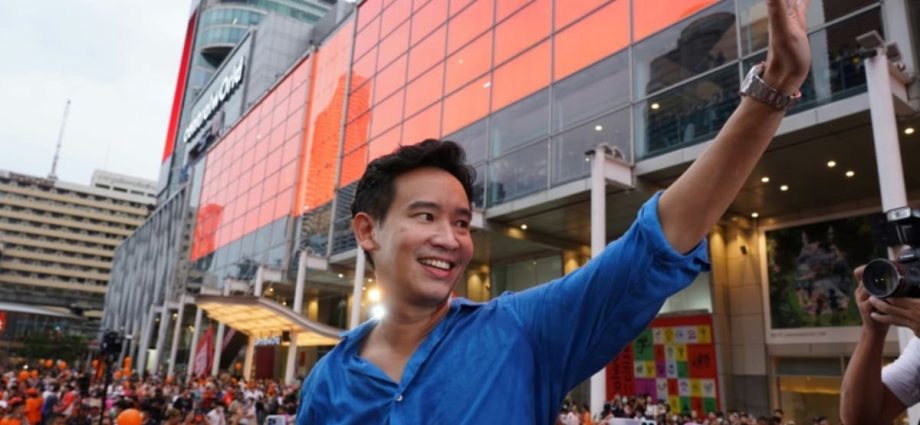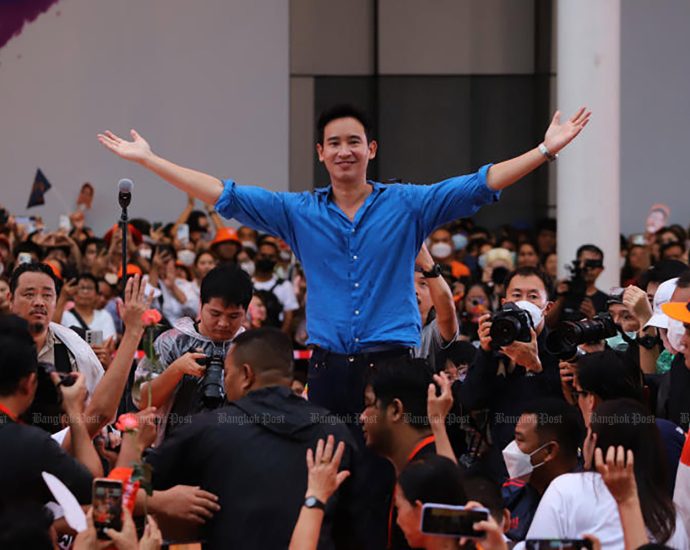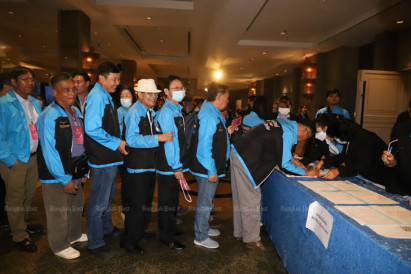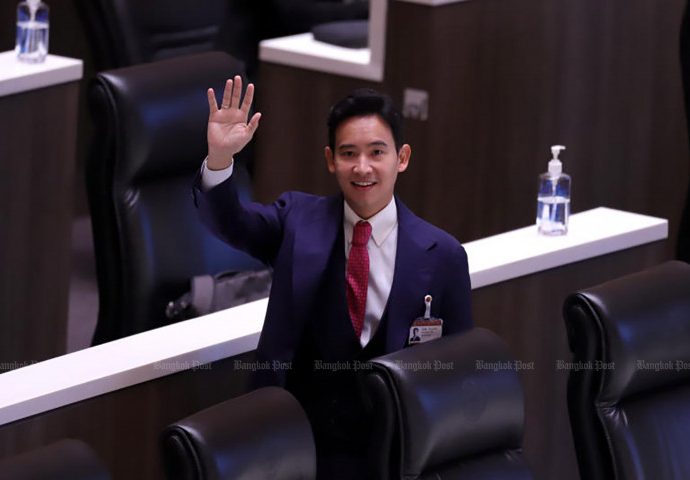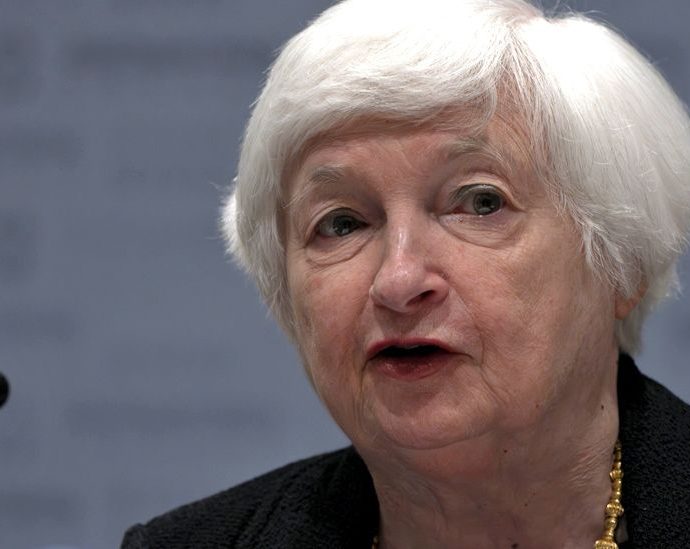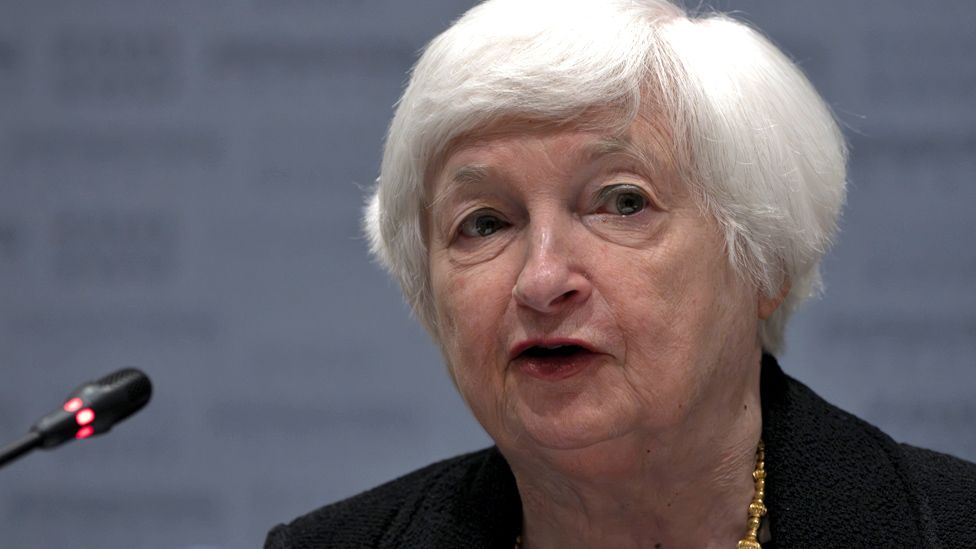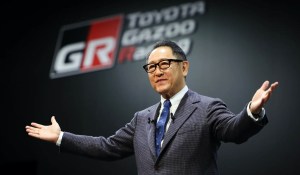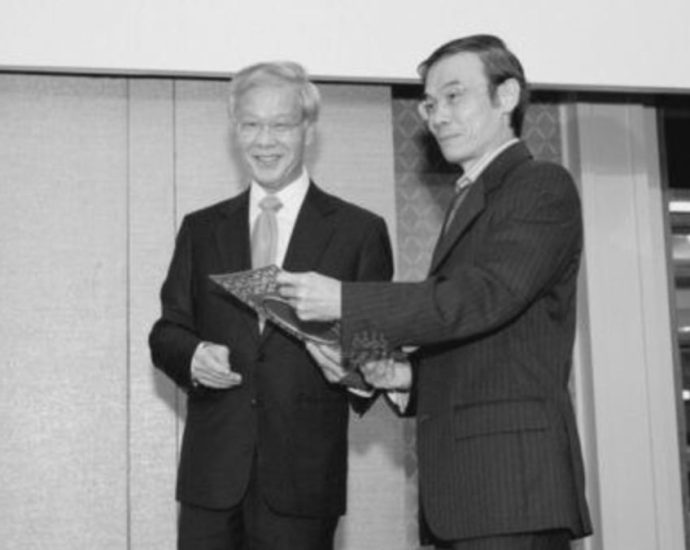Thai PM frontrunner rallies supporters ahead of parliamentary vote
Pita urged senators to remember “we’re all the people’s politicians”. “My thanks to those that say they’re on the people’s side and siding with the people’s majority,” he said. Following his speech, Pita told reporters that he had found “closer common ground” with the senators. “Hopefully, in the four daysContinue Reading
Pita warns parliamentarians against ‘unforgiveable’ affront to Thai democracy

Pita Limjaroenrat, the prime ministerial candidate of the election-winning Move Forward Party, on Sunday told parliamentarians that failure to vote for his premiership would be unforgiveable affront to Thai democracy.
Meeting about 1,000 supporters in front of CentralWorld shopping centre in Pathumwan district on Sunday evening, Mr Pita said Thursday (July 13) would be a historic day when House representatives and senators would have a chance to return normality to Thai politics.
“In four days it will be July 13 when lower and upper houses will jointly decide what Thai politics will be in the next decade.”
“With the right decision, Thailand will be second to none.”
“A wrong decision that is against the resolution will maintain the political abnormality of the past decade. I do not know when a golden opportunity like July 13 will recur,” Mr Pita said.
“Return normality to all people. Please do not miss this opportunity because people may not forgive and may lose faith in representatives and the parliamenty system. So, do not disappoint people,” he said.
He praised some senators who promised to “vote in favour of the people’s choice and coalition allies”, referring to the eight coalition allies – including his Move Forward Party and the Pheu Thai Party – which nominated him as the next prime minister in the Thursday vote of the joint sitting of parliament. The eight coalition allies number 312 out of the 500 House representatives.
“This opportunity is a historic moment for Thailand, the return of normality to Thai politics. All the 750 members of the lower and upper houses have the chance to return normality to Thai politics so that Thailand can progress and catch up with the world,” Mr Pita said.
He told the gathering of his supporters that he might not be a perfect prime minister, but he would be the most hard-working.
The constitution empowers senators to join House representatives in the vote for a prime minister at a joint sitting. The parliament consists of 500 elected representatives and 250 appointed senators.
To become prime minister, Mr Pita needs the support of a majority of the 750 members of the joint parliament – at least 376 votes. The eight coalition allies would need at least 64 more votes in the joint sitting on Thursday.
Many senators earlier said they could not support Mr Pita because his Move Forward Party planned to amend the lese majeste (royal insult) law.
Mr Pita’s route to the premiership is also jeopardised by petitions against his eligibility for political office related to his past shareholding in iTV plc and other legal technicalities.
The constitution prohibits a shareholder of a media organisation from running in a general election.
The Election Commission is investigating whether Mr Pita violated Section 151 of the organic law on the election of MPs.
Under the Section 151, anyone who runs in a general election while knowing he is unqualified to do so is liable to a jail term of up to 10 years, a fine of up to 200,000 baht and a 20-year ban on his electoral rights.
Numerous previous election winners in Thailand have been barred from taking office or removed by court rulings.
In 2020, Move Forward’s predecessor party Future Forward was dissolved after a ruling that a loan from leader Thanathorn Juangroonrungkit was a donation, and Mr Thanathorn was banned from politics for 10 years.
Late economist Lim Chong Yah a major contributor to Singaporeâs economic development: PM Lee

SINGAPORE: The late economist Lim Chong Yah made a major contribution to Singapore’s economic “take-off” in his role as founding chairman of the National Wages Council (NWC), said Prime Minister Lee Hsien Loong on Sunday (Jul 9).
The emeritus professor, who taught at both the National University of Singapore and Nanyang Technological University, died on Saturday at age 91.
In a condolence letter to Prof Lim’s wife Madam See Nah Nah, Mr Lee noted that Prof Lim was NWC chair from 1972 to 2001, which were “critical” years in Singapore’s economic development.
The NWC is a tripartite body with representatives from the government, trade unions and employers.
“The NWC’s annual negotiations and recommendations paved the way for smooth industrial relations and progressive wage adjustments,” said Mr Lee.
“The process helped maintain industrial peace, ensured workers enjoyed a fair share of the fruits of growth, and strengthened the tripartite partnership.”
Under Prof Lim’s stewardship, the NWC grew into a crucial institution unique to Singapore and trusted by all parties, the prime minister added.
In 1979, the NWC was involved in setting up a Skills Development Fund to encourage workers to upgrade their skills, as Singapore went from a labour-intensive economy to a skills-intensive one.
“Decades later, our journey continues, as we expand continuing education and lifelong learning to encompass the entire population. We continue to benefit from the principles and foundations that Prof Lim established,” said Mr Lee.
He also recounted the council’s work in 1986, a year after Singapore faced its worst economic downturn since independence. An economic committee chaired by Mr Lee recommended cutting the Central Provident Fund (CPF) contribution rate from 50 per cent to 35 per cent, while maintaining “severe wage restraint” to cut business costs” and restore Singapore’s competitiveness in the region.
“These were drastic recommendations,” said Mr Lee, who was acting minister of the Ministry of Trade and Industry (MTI) then.
“It was crucial that both employers and unions understood the national imperative, and the strategy was not derailed by over-generous and unrealistic wage settlements.”
Prof Lim worked closely with MTI during NWC negotiations and under his guidance “the economy revived faster than we had dared to expect”, said Mr Lee.
As the NWC matured and the economy developed over the years, the council expanded its focus to other areas such as promoting flexible wages.
It also paid attention to lower-wage workers, added Mr Lee, by crafting recommendations to make sure this segment received “meaningful wage increases and were not left behind as wages generally went up”.
Prof Lim was then given the Public Service Star in 1976, the Meritorious Service Medal in 1983, and the Distinguished Service Order in 2000 for his outstanding contributions to Singapore’s economic and national development.
Mr Lee also revealed that Prof Lim tutored him in economics for a year in 1970 while he was studying the subject for his A-Levels.
Describing him as a patient and caring teacher, Mr Lee recalled: “He would set me an essay topic each week, which I would research and write up before discussing it with him at the next tutorial. It was an active, intense and effective way to master the basics of the subject, which have remained with me and proven invaluable all my life.”
Prof Lim has two daughters and two sons. One of his children, lawyer Lee Suet Fern, became the prime minister’s sister-in-law after marrying his brother, Mr Lee Hsien Yang.
“Professor Lim will be deeply missed. I hope you will find comfort in knowing that his memory and legacy will live on through his many lasting contributions to Singapore and their impact on generations of Singaporeans,” said Mr Lee.
HUMBLE BEGINNINGS
In Prof Lim’s pre-teen years, he farmed rice, tapioca and vegetables to contribute to his family’s income, according to an article by the National Library Board (NLB). He also worked as a bread delivery boy at 14 years old.
His father was a shopkeeper while his mother died when he was eight.
Prof Lim was later awarded a Malacca Settlement scholarship to study economics at the University of Malaya, then located in Singapore.
He later joined the administrative service before embarking on a career in academia.
The NWC said in a statement on Sunday that Prof Lim’s task as its pioneering chairman was “particularly difficult” as labour management relations back then were “fraught with tensions”, but he built up trust among tripartite members by establishing a key principle of unanimity in decision-making.
With its annual wage guidelines formulated over the years, NWC made Singapore’s wage system “into one which is flexible and responsive to the changing needs of employers, employees and the economy”, said the council.
In a Facebook post on Saturday, Minister for Manpower and Second Minister for MTI Tan See Leng described Prof Lim as a distinguished economist whose contributions to the country “went far beyond the academic realm”.
He also highlighted Prof Lim’s “unceasing” concern for the livelihoods and welfare of low-wage workers.
Workers’ Party Member of Parliament Jamus Lim also expressed his admiration for the late Prof Lim’s works, which he first encountered as an undergraduate.
“Two decades on, I still assign his book on Southeast Asian economies in my courses,” said the Sengkang MP and lecturer at ESSEC Business School.
According to NLB, Prof Lim published more than 160 peer-reviewed journal articles, monographs, and books – two of which are popular as Singapore’s A-Level texts.
Singapore’s ambassador-at-large Tommy Koh said he became friends with Prof Lim when they were deans of NUS’ law and arts faculties respectively.
“He was as concerned about economic growth as he was about the fair distribution of prosperity,” Prof Koh wrote on Facebook on Sunday.
“He was offended by the growing gap between our top earners and those at the bottom of our pyramid.”
Prof Lim was also a member of the Presidential Council for Minority Rights and outside of Singapore, served as an economic consultant to the United Nations and World Bank commissions among others.
In a tribute post, NTU described Prof Lim as “an eminent economist and educator who has left an indelible mark”, and whose “foresight and “innovative thinking has guided the economic and national development of Singapore”.
Editor’s note: This article has been updated to correct information which said that Singapore had transitioned from a skills-intensive economy to a labour-intensive one. It should have been from a labour-intensive economy to a skills-intensive one. We apologise for the error.
Democrats fail to pick new leader

A meeting of the Democrat Party failed to elect a new leader and party executives because of a lack of quorum on Sunday.
The special meeting started at Miracle Grand Convention Hotel in late morning because Jurin Laksanawisit resigned as the party’s leader on May 14 as results of the general election filtered through.
His resignation caused an automatic end to the Democrats’ executive board under his tenure.
Key Democrats showed up for the planned vote on Sunday morning. They included former leader Chuan Leekpai, Banyat Bantadtan, Mr Jurin and Abhisit Vejjajiva – who refused to comment on a report that he would be nominated as a candidate for the leadership.
The party had its quorum for the meeting when it started at 10am as 299 members attended it. Its quorum needed at least 250 present party members.
Mr Jurin, who presided over the meeting, thanked party members for overcoming both internal and external challenges. He said he believed the Democrat Party would return to its glorious past. The party won 25 out of 500 House seats in the May 14 general election.
Party members then discussed regulations on voting weights between present and former Democrat MPs versus former leaders, ministers and political position holders. Acting Democrat deputy leader Ong-art Klampaibul proposed the party postpone the vote for 60 days.
At 2.30pm the party checked its quorum which turned out to be insufficient because there were only 221 attendees.
The meeting adjourned to wait for more attendees. At 3pm its quorum was checked again and there were only 201 participants. Mr Jurin then closed the meeting. He said he would convene the next meeting on Wednesday.
Party leadership hopeful Mallika Boonmeetrakul said many Democrats sat outside the meeting venue and caused the lack of a quorum.
Before the meeting, Mr Chuan – a well-respected former prime minister – said there was palpable concern about the future direction of the 78-year-old party.
Activist Ruangkrai continues crusade against PM hopeful Pita

Political activist Ruangkrai Leekitwattana has continued his crusade against Move Forward leader and prime ministerial candidate Pita Limjaroenrat.
Mr Ruangkrai said he had earlier sent a letter to the Election Commission (EC) asking it to investigate and seek a Constitutional Court ruling whether Mr Pita, in holding the copyright of four books he authored, publishing them and making some income from selling them, had forfeited his right to be an MP and candidate for prime minister under Sections 98 (3) and 101 of the 2017 constitution.
Veteran politician Ruangkrai – known for switching parties and allegiances, and previously described as a political “giant-killer” – said that following his letter to the EC, many people commented online without true knowledge of the law.
To clarify matters, he said on Sunday he was sending another letter to the EC asserting that under the Publication Act of 2007, the fact that Mr Pita had authored the four books, published them and made money from selling them meant he had been involved in a media business.
Mr Ruangkrai earlier petitioned the EC, saying that Mr Pita’s ownership of iTV shares meant he was ineligible when he registered to run for election.
In another move against Mr Pita, senator Somchai Sawaengkarn on Sunday posted a statement on his Facebook page directed at the EC.
The commission on June 9 threw out all complaints related to media share ownership against Mr Pita, saying that it would instead investigate whether Mr Pita applied to be a list-MP candidate despite knowing he might not have been eligible.
EC chairman Ittiporn Boonpracong said, with information available, a committee would be set up to further investigate whether Mr Pita violated Section 42 (3) and Section 151 of the law on the election of MPs.
Mr Somchai said the EC should quickly exercise its power under Section 82, paragraph 4, of the constitution to ask the Constitutional Court to rule whether Mr Pita had applied to run in the election despite knowing he might not be eligible.
The senator said the EC, in failing to do this, could be deemed to have neglected its duty under Section 157 of the Criminal Code.
US-China talks a ‘step forward’ in relations, says Janet Yellen
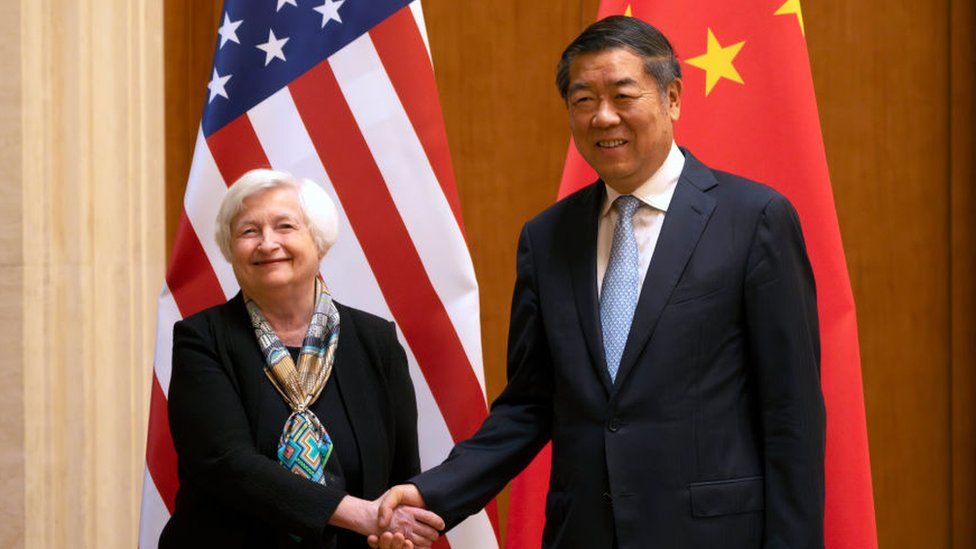 Getty Images
Getty ImagesUS Treasury Secretary Janet Yellen has said her visit to Beijing has marked a “step forward” in efforts to stabilise relations between the two countries.
Ms Yellen spoke at the end of a four-day trip, during which talks were held over issues including climate change.
She described the talks as “direct, substantive and productive” and said both sides had learned more about each other.
However, she admitted the US and China still had “significant disagreements”.
“No one visit will solve our challenges overnight,” she said.
“But this trip will help build a resilient and productive channel of communication with China’s new economic team.”
The US-China relationship has deteriorated in recent years. Issues dividing the country include human rights in Xinjiang and Hong Kong, territorial claims to Taiwan and the South China Sea and Beijing’s growing domination of a host of industries.
Chinese Vice Premier He Lifeng, who was among those to meet with Ms Yellen, said on Saturday he regretted “unexpected incidents” – such as the row over a spy balloon – had hurt ties with the United States.
Ms Yellen stressed the need for better communication in order to try and overcome these issues, adding that US President Joe Bien did “not see the relationship between the US and China through the frame of great power conflict.
“We believe that the world is big enough for both of our countries to thrive.”
On the issue of economic competition, Ms Yellen said the US sought a “dynamic and healthy global economy that is open, free and fair, not one that is fragmented or forces countries to take sides”.
She said any future curbs to business with China would be implemented “in a transparent way” and focus on sectors where the US had “specific national security concerns”.
Earlier in the visit, Ms Yellen criticised Beijing’s curbs against US firms, including the tightening of controls over exports of two materials crucial to producing computer chips.
The move follows Washington’s efforts in the past year to curb Chinese access to some advanced computer chips.
Ms Yellen said the US would fight back against China’s “unfair economic practices”.
In response, China’s finance ministry said “the nature of China-US economic and trade relations is mutually beneficial and win-win” and that there was no winner in a trade war.
On climate change, Ms Yellen urged Beijing to work with the US and support institutions like the Green Climate Fund, which was set up to help developing nations adapt to climate change and lessen its effects.
The Treasury Secretary was the second senior Washington official to visit Beijing in the last two months.
US Secretary of State Antony Blinken visited Beijing in June – the highest-ranking Washington official to visit the Chinese capital in almost half a decade.
His sentiments at the end of his trip echoed Ms Yellen’s. He said that while there were still major issues between the two countries, he hoped they would have “better communications, better engagement going forward.”
However, the next day President Joe Biden referred to Mr Xi as a “dictator” – triggering outrage from Beijing.
Despite the political tensions, trade between the two countries grew in 2022 for the third year in a row.
According to official figures, China exported more than $536bn (£422.3bn) worth of goods to the US last year, while $154bn of goods went in the other direction.
Related Topics
-
-
22 hours ago
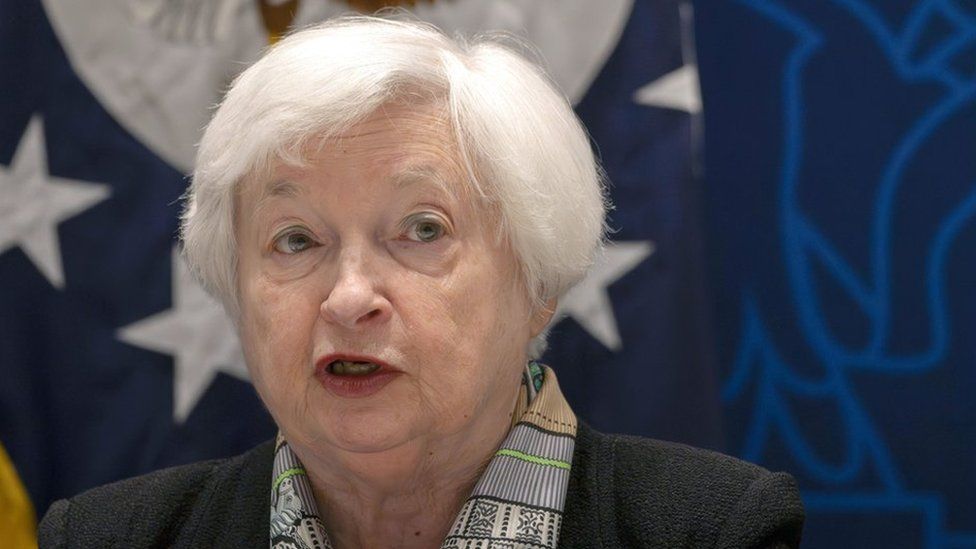
-
Missing German man’s ‘cleaned’ Mercedes found in Pattaya

PATTAYA: Police have found a Mercedes-Benz coupe with traces of bathroom cleaner after its owner, a 62-year-old German property broker, went missing on July 4.
The silver Mercedes-Benz E350 coupe registered in Bangkok was found at the parking lot of CC Condominium on Khao Noi Road in tambon Nong Prue of Bang Lamung district on Sunday morning. It belonged to Hans Mack who has lived with his 24-year-old Thai wife for five years.
Pol Maj Gen Theerachai Chamnanmor, investigative chief of the Provincial Police Region 2, said on Sunday the discovery dimmed hopes for Mr Mack’s safe return because there were traces of either coolant or bathroom cleaner fluid on the seats, dashboard, steering wheel, gearbox and other interior parts of the car. The apparently “cleaned” parts showed solvent stains.
“There was intention to destroy evidence and the case indicates that Mr Hans Peter Ralter Mack’s disappearance was suspicious,” Pol Maj Gen Theerachai said.
A local food vendor said the car was parked there a few days ago and two women got out. One of them had dark skin and was about 160 centimetres tall.
A 54-year-old German woman, a property broker, told police she met Mr Mack on July 4 to discuss potential sales worth hundreds of millions of baht of a pool villa on Koh Samui and a boxing stadium in Bang Lamung district. After the talk, they separated.
The German man’s family has offered a 3-million-baht reward for information that could help locate him.
Mr Mack’s Thai wife, Piraya Boonmak, said he drove from their Swiss Paradise housing estate in Pattaya to meet a foreign property broker he had recently met. The family filed a disappearance complaint with local police on July 5.
The German man had two sons. One of them was in the country and the other was in Spain, she said.
Surveillance camera footage showed the German man went to a restaurant on Thung Klom-Tan Man Road at 11.54am on July 4 and left the place at 12.37pm on the same day.
He drove past Chaiyaphruek intersection towards Jomtien beach – the last known image of his whereabouts.

White stains are seen on the interior of the Mercedes-Benz coupe. Police suspect they resulted from cleaner fluid possibly used to destroy evidence. (Photo: Chaiyot Pupattanapong)
North Korea slams IAEA for Fukushima water approval
About 1.33 million cubic metres of groundwater, rainwater and water used for cooling have accumulated at the Fukushima nuclear plant, where several reactors went into meltdown after the 2011 tsunami overwhelmed cooling systems. The plant operator treats the water to remove almost all radioactive elements except tritium, and plans toContinue Reading
Japanâs automakers well behind the EV times
Japanese automakers are risking a repeat of the decline of Detroit’s big three automakers – Chrysler, Ford and General Motors – because of their resistance to electric vehicles (EVs). Nearly 40% of Americans who bought Teslas had switched from Japanese brands, primarily from Toyota and Honda.
At a time when 25% of new car sales in China are EVs or plug-in hybrids, a lack of EVs is costing Japanese brands sizeable sales. In a market weakened by Covid-19, Japanese brands tumbled the most — by a third from the year before — compared to just 9% for US and European brands.
After surpassing Germany to become the world’s second-largest auto exporter in 2022, China is on track to surpass Japan relatively soon. Given the long-term decline in car sales within Japan — with 2022 sales 26% below that of 1996 — a loss of market share in exports is a serious hit.
The export problem is also largely because of EVs, which now account for half of all Chinese automobile exports. Most of these are made by foreign brands, usually through joint ventures with domestic partners.
In the first half of 2022, Western Europe accounted for around 34% of China’s total car exports. China’s share of the European EV market is predicted to rise from 5% in 2022 to 15% as early as 2025.
Japanese automakers are finally waking up and making some changes. In December 2021, Toyota announced its goal of producing 3.5 million battery EVs by 2030, up from the previous goal of 2 million.
The new goal equals 35% of the company’s 2022 global sales. Honda now targets 2 million battery EVs by 2030, equal to half of current sales. Even with these changes, Japan significantly lags behind other wealthy countries.

Unfortunately, these companies are still hedging their bets by spending billions of dollars on cars that are either losing popularity — such as hybrids — or were never popular, like plug-in hybrids and the truly futile hydrogen fuel cell vehicle.
In 2022, global sales of battery EVs and plug-in hybrids combined overtook traditional hybrids, but sales of battery EVs were three times as high as plug-in hybrids.
In January 2023, the plug-in hybrid share in the United States was still a measly 1.2% while the battery EV share hit 6.2% and will keep rising. Bloomberg New Energy Finance believes that global gasoline car sales peaked in 2017 and will never recover.
Yet both Japan’s government and automakers are still obsessed with the romance of hydrogen fuel cell cars. Tokyo allots more subsidies to fuel cell cars than to EVs. The Mirai, Toyota’s fuel cell car, was introduced in 2015 but has only sold 22,000 units worldwide since then.
The irony is that Chinese brands seem to be repeating exactly what Japanese automakers did to Detroit’s big three, and for the same reason — a shift in technology and market conditions that dominant oligopolists fail to adapt to.
Until the two oil price shocks of the 1970s, Detroit’s big three’s market share held up at 85%. Then, oil prices suddenly rose at the same time as the government’s imposition of stricter pollution controls.
Japanese brands seized the opportunity to offer smaller, more reliable, fuel-efficient and less polluting cars, while Detroit resisted improving fuel efficiency and lowering emissions.
Japanese automakers also put computer chips into their cars before others. Within less than a decade of the oil price shocks, Japan became the world’s biggest auto exporter, prompting protectionist measures in both the United States and Europe.
Today, Detroit’s combined market share in the United States is down to just 40%, and Toyota has become the world’s biggest automaker, a status that General Motors previously enjoyed for 77 years.
Just as success blinded Detroit to a change in the times, it has done the same with Japanese brands. Just-retired Toyota chieftain Akio Toyoda dismissed EVs as overhyped and repeated the myth that shifting to EVs would actually increase carbon emissions.

The latter is only the case where coal generates an unusually high share of electricity — globally, EVs emit 30% fewer emissions than gasoline cars and the advantage keeps increasing as the use of renewables grows.
Toyoda’s successor, Koji Sato, told the press, “we will thoroughly implement electrification, which we can do immediately.” But many analysts remain skeptical of his commitment.
Japanese automakers seem to assume that they can still focus on hybrids and catch up if the time comes to focus on EVs. But it is not clear whether catchup will be easy, partly due to internal corporate culture.
It is common for managers and engineers at highly successful companies to become too attached to the business model and technology that originally brought them success. Insiders say that many Japanese executives hesitate to stray too far from the policies of the seniors who promoted them.
It is not impossible for Toyota, Honda and other Japanese automakers to change course and avoid a plunge in market share. But time is not on their side.
Richard Katz is Senior Fellow at the Carnegie Council for Ethics in International Affairs. This is an adapted version of a piece that originally appeared here on Japan Economy Watch.
This article was originally published by East Asia Forum and is republished under a Creative Commons license.
Dedicated colleague, gentle legal giant: Law fraternity pays tribute to late NUS professor Tan Yock Lin
SINGAPORE: Members of Singapore’s legal fraternity on Sunday (Jul 9) paid tribute to the late law professor Tan Yock Lin, describing the 70-year-old as a learned mentor always generous with his time for others. “We are profoundly saddened by Professor Tan Yock Lin’s passing, and our deepest condolences go outContinue Reading

